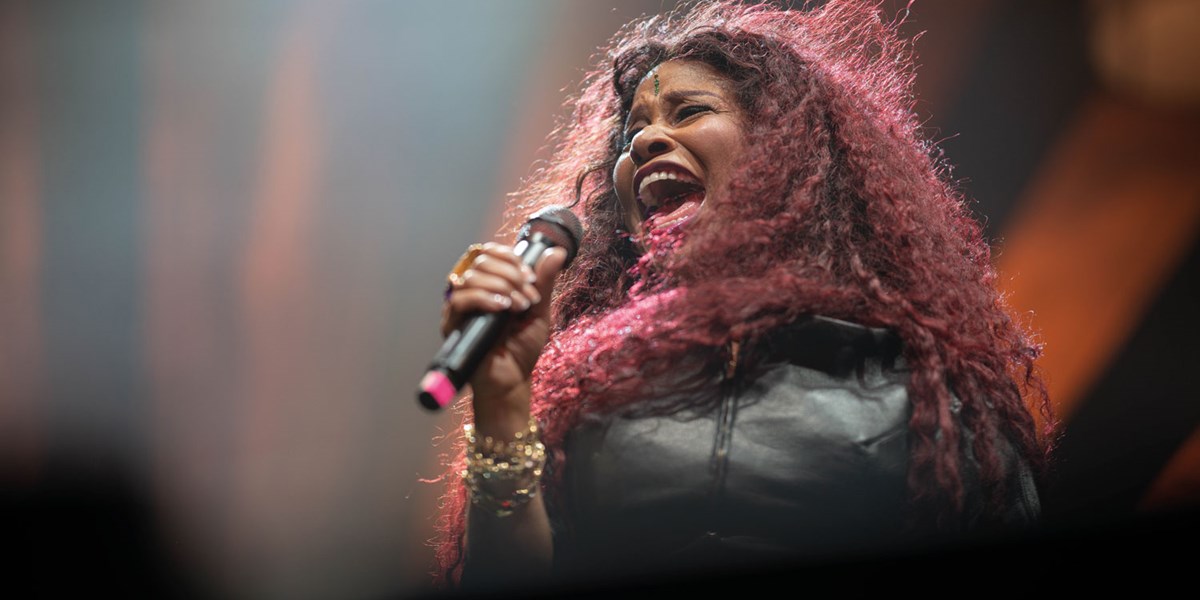Thursday, April 4, 2024
Report on Riyadh International Jazz Festival 2024
Robin Denselow heads to Saudi Arabia to find integrated crowds, local groups searching for an identity and a very surprising rush to the stage

Chaka Khan performing at Riyadh International Jazz Festival
Until six years ago, men and women weren’t even allowed to attend concerts together in Saudi Arabia, but here was Chaka Khan singing ‘I’m Every Woman’ and telling her mixed audience to “get on up.” There have been pop shows in the Kingdom before but this was a government-funded festival at a venue where the audience were supposed to remain seated. How should they react? They didn’t just start dancing but rushed to the foot of the stage. “Things have really changed,” said Mazen Lawand, guitarist with the Saudi Arabian ‘alternative fusion’ band Garwasha.
The first Riyadh International Jazz festival, which took place February 7-9 in Riyadh, Saudi Arabia, was an intriguing affair. The Mayadeen exhibition hall, out in the ancient Diriyah region, had been transformed into a plush 1,800-seat venue, with video screens showing old footage of jazz dancers and then close-ups of the artists. The large stage was decorated with fan designs and giant lamp-stands, like some 1930s art-deco jazz club and (apart from the dreadful opening to Chaka Khan’s set) the sound was mostly excellent. Outside, among the palm trees in the VIP area, local artists sang jazz standards while guests were treated to tea and cakes. There was, of course, no alcohol.
The headliners were all international artists, but each of the three nights began with local musicians. First up was fulana (aka Nadine Lingawi), a singer-songwriter from Jeddah who explained that her stage name means “‘anonymous woman’ – because when I started it wasn’t acceptable for women to be making music, so I posted it anonymously online.” She said she grew up listening to Britney Spears and loved the Canadian indie-rock band Metric. She didn’t wear a headscarf and was accompanied by a keyboard player for a set of accomplished Western-sounding pop songs in English with no hint of local influences – though there was applause when she finally started singing in Arabic. She said that very few other Saudi women singers wrote their own songs, but many were doing jazz covers.
Majaz, from Bahrain, were more distinctive, mixing cello with electric guitar, bass and drums for a jazz-rock fusion set that incorporated influences from the Gulf and Africa. They were at their best when they switched to passages of handclaps and chanting. Finally came Garwasha, an all-male Saudi band playing electric guitar, bass and drums, but with a Sudanese keyboard player. They said they were using rhythms and melodies from across the country (insisting that they should be as influential as Brazilian styles) in an assured, all-instrumental jazz-rock set that featured rapid-fire, but never over-flashy, guitar work from Lawand. They were at their best with cool and atmospheric late-night pieces that deserve to be heard beyond the Kingdom.
Apart from Chaka, there was fine (and well-received) British jazz from YolanDa Brown and Kokoroko and a glorious global music tour from Australia’s The Cat Empire, who switched from brass-backed Latin styles to country-rock and even Seychellois sega. This lavish, easy-going festival was produced by the Ministry of Culture’s Music Commission, whose CEO Paul Pacifico (ex-UK Association of Independent Music) said that a “seismic cultural shift is underway… the line is moving the whole time”. It will be fascinating to see how far it goes.
This article originally appeared in the May 2024 issue of Songlines. Never miss an issue – subscribe to Songlines today

